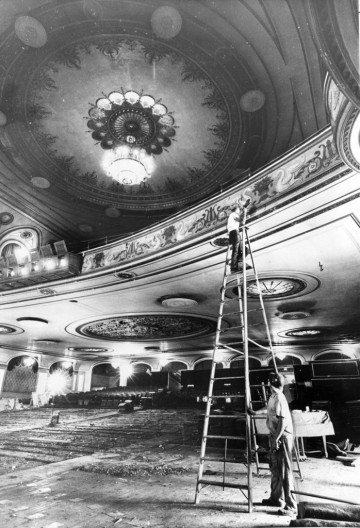Condit: History Comes Alive Through Theatre Tales and Tours
Friday, May 29, 2015

If you think history is irrelevant and boring, I challenge you to hear the stories told by a committed group of docents during the Historical & Architectural tours at The Hanover Theatre.
Historical architect, Susan Ceccacci, provided research and met with a group of dedicated volunteers: Marshall and Judy Rothbard Tate (Berlin), Bob Breault (Auburn), John Riccio (Worcester), and Renee Peace (Auburn). For those who know about Sylvester Poli, you’ll be thrilled by the stories incorporated into these tours. (To hear a preview of what to expect, listen to their interview on Behind the Scenes at The Hanover Theatre.)

Some of his theatres operated for 12 hours a day, from 9:30am to 9:30pm, with vaudevillian performers and silent movies providing the entertainment. It was Poli’s goal to provide entertainment for the masses, and this sentiment is reflected in some of the architectural details at The Hanover Theatre. He understood that the future of the entertainment industry relied on attracting not just men, but women and families. This included a large number of immigrants who worked in area factories during the Industrial Revolution. The price of admission was only 10, 20 and 30 cents per person, so volume was imperative to sustaining his businesses.
Poli enforced an intolerance of vulgarity at his theatres. In 1912, the theatre owner even banned Mae West because he felt she had an “enchanting, seductive, sin-promising wiggle” that was inappropriate for the women and children he wanted to bring into his magnificent venues. Poli was also responsible for implementing a code of conduct and introducing the concept of ushers to enforce protocol with patrons. Similar to today, ushers would ask patrons disrupting others’ enjoyment of the overall theatre experience. Prior to that, the crowds at theatres tended to be lewd and crude. Poli transformed how people perceived live entertainment and created a strong sense of community with his theatres as gathering places to learn about current events as well as enjoy leisure time.
The first tour is Wednesday, June 3 at noon. This event is free for members of The Hanover Theatre, and $5 for the general public.
Related Articles
- Worcester’s 10 Coolest People: Lisa Condit, Hanover Theatre Director of PR
- Condit: Take Your Passion and Make It Happen!
- Condit: What’s a Food Hub, and What Does it Have to do with Theatre?
- Condit: Cooperation and Good Will for a Great Cause with Dancing Pros: Live!
- Condit: Classic Fun for All, Live and In Color!
- Condit: What do Wanda Sykes and my Two Best Friends Have in Common?
- Condit: Provocative Pink Martini Mixes with Young Professionals
- Condit: Camelot: Fresh Take on King Arthur and the Knights of the Round Table
- Condit: Leadership Tips from the Improv Experts
- Condit: Behind the Scenes with Roger McGuinn
- Condit: Audition Notice for Role in Production of Camelot at The Hanover Theatre
- Condit: Behind the Scenes with The Hanover Theatre
- Condit: Theatre Brings TV Favorites to Life for Young Audiences
- Condit: Frank Carroll’s Mission to Help Feed the Hungry Continues
- Condit: The Hanover Theatre Announces Season Full of Broadway Smash Hits
- Condit: The Hanover Theatre Celebrates Its Birthday with Founders Tours




Follow us on Pinterest Google + Facebook Twitter See It Read It